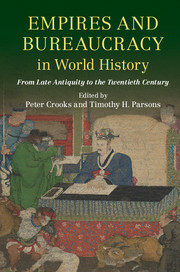Book contents
- Frontmatter
- Contents
- List of Figures
- List of Maps
- List of Tables
- List of Contributors
- Preface
- List of Abbreviations
- Part I Introduction
- Part II Empires and Bureaucracy in World-Historical Perspective
- Part III From Late Antiquity to the Middle Ages
- 6 ‘The Late Roman Empire Was before All Things a Bureaucratic State.’
- 7 Bureaucracies, Elites and Clans: The Case of Byzantium, c.600–1100
- 8 Charlemagne and Carolingian Military Administration
- 9 Bureaucracy, the English State and the Crisis of the Angevin Empire, 1199–1205
- 10 The Parchment Imperialists: Texts, Scribes and the Medieval Western Empire, c.1250–c.1440
- 11 Before Humpty Dumpty: The First English Empire and the Brittleness of Bureaucracy, 1259–1453
- Part IV From the Age of European Expansion to the End of Empires
- Part V Afterword
- Index
10 - The Parchment Imperialists: Texts, Scribes and the Medieval Western Empire, c.1250–c.1440
from Part III - From Late Antiquity to the Middle Ages
Published online by Cambridge University Press: 05 August 2016
- Frontmatter
- Contents
- List of Figures
- List of Maps
- List of Tables
- List of Contributors
- Preface
- List of Abbreviations
- Part I Introduction
- Part II Empires and Bureaucracy in World-Historical Perspective
- Part III From Late Antiquity to the Middle Ages
- 6 ‘The Late Roman Empire Was before All Things a Bureaucratic State.’
- 7 Bureaucracies, Elites and Clans: The Case of Byzantium, c.600–1100
- 8 Charlemagne and Carolingian Military Administration
- 9 Bureaucracy, the English State and the Crisis of the Angevin Empire, 1199–1205
- 10 The Parchment Imperialists: Texts, Scribes and the Medieval Western Empire, c.1250–c.1440
- 11 Before Humpty Dumpty: The First English Empire and the Brittleness of Bureaucracy, 1259–1453
- Part IV From the Age of European Expansion to the End of Empires
- Part V Afterword
- Index
Summary
‘The dear Holy Roman Empire, whatever holds it together?’ sings a reveller in Auerbach's Cellar in part one of Faust, which Goethe completed in 1806, the year of the Empire's extinction. For the late Middle Ages, it is a question with which historians continue to grapple, one which has elicited various theories, but no certainty. On one matter at least, however, a well-established and durable consensus does exist: whatever it may have been, it can have had little to do with bureaucracy. Of no period does this appear truer than of the late Middle Ages. The medieval Roman Empire was at no time an intensively governed polity. Even in the heyday of its power, in the eleventh and twelfth centuries, the institutions of the Empire's government reached thinly and very unevenly across its vast geographic extent. About their working and their efficacy a great deal is obscure. Much always depended upon the monarch's personal presence. However, in the two centuries between the end of the Hohenstaufen dynasty in the mid-thirteenth century and the long Habsburg ascendancy which begins in the fifteenth, such administrative structures as existed for the Empire appear actually to wither and contract. Relatively little in the way of new institutions emerged to take their place. And yet, despite all this, hold together the Empire largely did, albeit with some erosion, including the loss of significant territorial fragments at the margins. Explaining why this should have been raises important questions, both about the character of the medieval Reich as an empire and about the role of administration in extended premodern realms more generally.
The imperial character of the late-medieval Empire was expressed most explicitly in its fundamental doctrines, in its accustomed titles and in the views of history held by its literate partisans. An empire – in Latin, imperium; in German, less straightforwardly, rîche – was what documents issued in its ruler's name consistently pronounced it to be. To lawyers, chroniclers, poets and their audiences, it was the direct continuator of the Roman empire of the Caesars. By the late Middle Ages, this principle, reinforced by an imperialist reading of a number of familiar biblical passages, had long provided a foundation for highly ambitious claims.
- Type
- Chapter
- Information
- Empires and Bureaucracy in World HistoryFrom Late Antiquity to the Twentieth Century, pp. 221 - 249Publisher: Cambridge University PressPrint publication year: 2016

